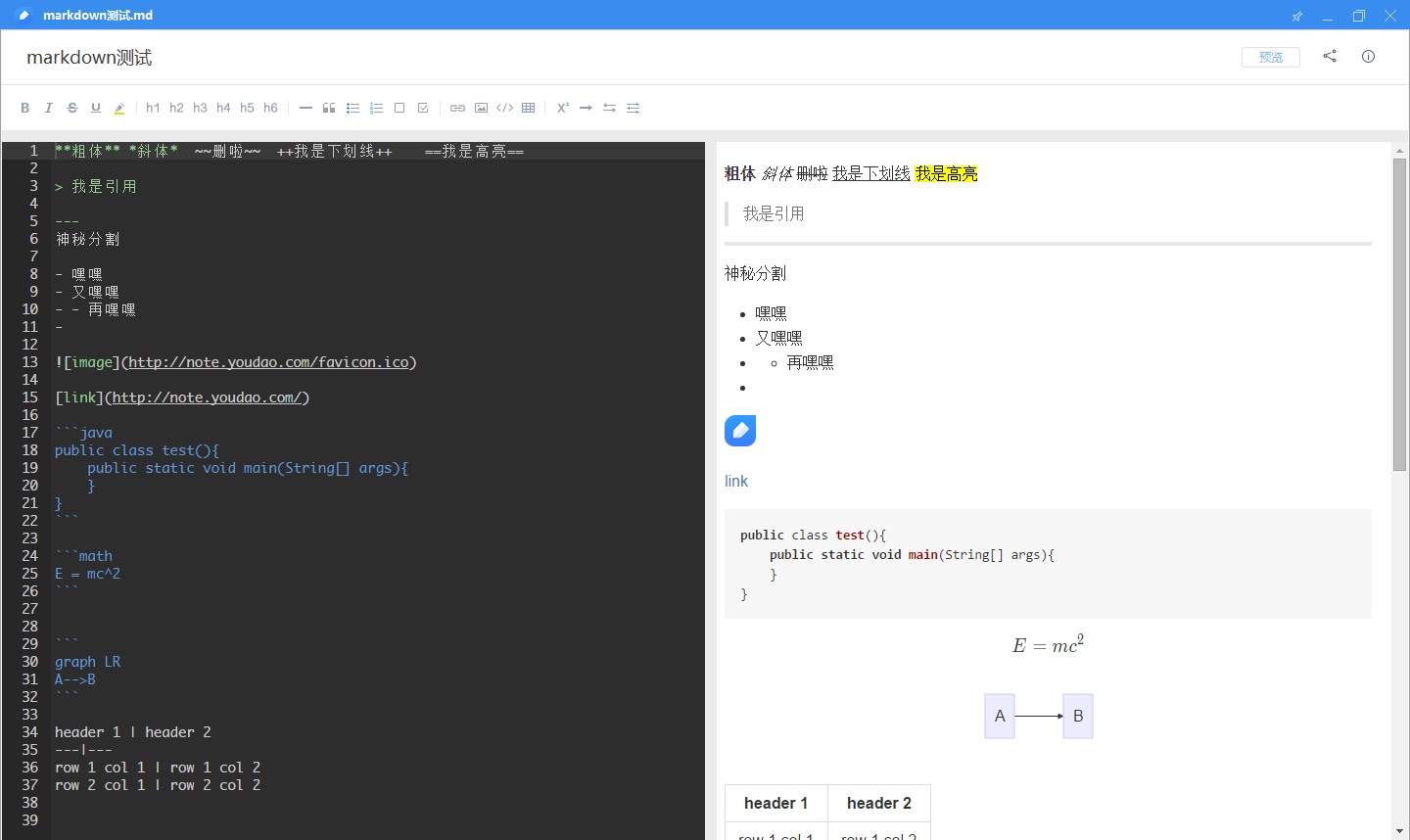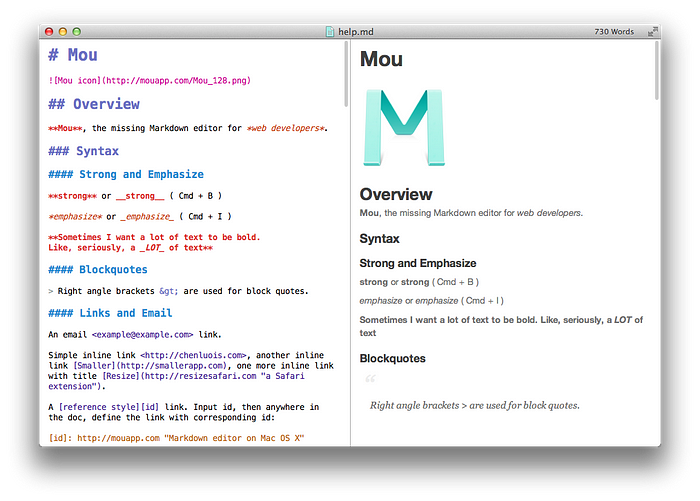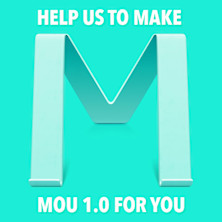We'll pick the most wanted features from our contributors, implement them and release Mou 1.0. Check out 'Mou 1.0: Markdown editor on OS X, for you.' Markdown lets you compose posts and comments with links, lists, and other styles using regular characters and punctuation marks. Markdown is used by writers and bloggers who want a quick and easy w.
Markdown editor for developers.
Mou 0.8.7 beta, supports OS X 10.7 to 10.11 (currently doesn't support Sierra, we're still working on it)
Mou/məʊ/ is a Markdown editor for developers, on Mac OS X. Features live preview, sync scroll, auto save, powerful actions, auto pair, custom themes and CSS, HTML and PDF export, enhanced CJK support and more.
Actions
Mou comes with lots of handy actions. All you need for writing in Markdown is here, and blazing fast!
Enhanced CJK Support
Write in Chinese, Japanese or Korean? No problem! Mou fully supports CJK Characters!
View Control
Toggle live preview and layout orientation. Write in Chinese traditional way using vertical layout.
Custom Themes
Choose a built-in theme you like, or create your own.
Custom CSS
Custom CSS for Live Preview and HTML Export is also possible.
Incremental Search
Mou features incremental search with pattern matching.
Auto Completion
Mou features auto completion for English words. Press `Esc` key to show a list of possible completions.

Export HTML
Export HTML anytime you want, with or without CSS.
Words Counter
Beautiful counter, counts words, characters and bytes.
Command Line
Launching Mou from Terminal, type open -a Mou. To open file, type open example.md or open -a Mou example.md.
Post on Scriptogr.am and Tumblr
Publish your article to Scriptogr.am or Tumblr directly within Mou, with a single command.
More features coming!
Mou is currently in early beta stage, which means there's a lot room to add new features if we keep working on it. If you like this app, preorder Mou 1.0 to help keep development going!
Excited?
Download Mou beta nowMou 0.8.7 beta, supports OS X 10.7 to 10.11 (currently doesn't support Sierra, we're still working on it)
Still on OS X 10.6? Download the old version.
Our Partners
Format
This exercise works well as an in-person workshop or an online exercise. It can be done individually or in a group.
Target Audience

Open science project and community leads and Mozilla Study Group leads seeking to attract and grow communities of contributors around their projects
Materials
- Pen/pencil & paper
- Collaborative document editor like Etherpad or Google Docs
- A markdown viewer (such as Mou) to test your file before posting online
Introduction
Mou Markdown Editor
A CONTRIBUTING.md file, in your open source repository or site, provides potential project contributors with a short guide to how they can help with your project or study group. It is convention to capitalize the word 'contributing' as the file title, and to save it as a resource in markdown (hence the extension .md).
This file is for:
- Project owners - creators and maintiners of the file
- Project contributors - users of the file who want to know items they're welcome to tackle, and tact they need in navigating the project/respecting those involved with the project
- Project consumers - users who want to build off the project to create their own project
CONTRIBUTING.md should be in your root directory, think of it as a anchor for your project, around which you will build community and keep things tidy. It complements other 'all-caps' resources like your README.md (which introduces your community to the project, its purpose and basic installation requirements), or your LICENSE.md (which provides information on the reuse and permissions associated with the code).
The CONTRIBUTING.md should be one of your first priorities in putting an open source/science project online to solicit contributions. If you have yet to define possible avenues of contribution, consider creating a CONTRIBUTING.md file with a 'check back later, we will populate this soon' message, and the contact information of the project lead for follow-up.
You should try to build a draft of the CONTRIBUTING.md file with the core contributors to your project to help them feel a shared sense of responsibility and to create the best possible guide for encouraging new contributors. It is sometimes best to practice building a markdown file in an offline program like Mou or an online one like Dilliger before you post it online.
Steps to Complete
Mou Markdown Editor
Start by reflecting on what to include, and what to invite (in terms of contributions) in your CONTRIBUTING.md. See an example of the Atom.io CONTRIBUTING.md file. Consider adding the following elements to your file.
- Welcome contributors to the project: Admit that you are eager for contributions and so happy they found themselves here.
- Table of Contents: If your CONTRIBUTING.md file is long, you might consider including a table of contents with links to different headings in your document. In github, each heading is given a URL by default, so you can link to that URL in the appropriate section of the Table of Contents for each heading. Do this in Markdown by wrapping the heading in [ ] and following with a parenthetical that includes the URL or header after # like
[Reporting Bugs](#reporting-bugs). - Short Links to Important Resources:
docs: handbook / roadmap (you'll learn more about this in the roadmapping session)
bugs: issue tracker / bug report tool
comms: forum link, developer list, IRC/email - Testing: how to test the project, where the tests are located in your directories.
- Environment details: how to set up your development environment. This might exist in the README.md depending on the project. If so, include a link.
- How to submit changes: Pull Request protocol etc. You might also include what response they'll get back from the team on submission, or any caveats about the speed of response.
- How to report a bug: Bugs are problems in code, in the functionality of an application or in its UI design; you can submit them through 'bug trackers' and most projects invite you to do so, so that they may 'debug' with more efficiency and the input of a contributor. Take a look at Atom's example for how to teach people to report bugs to your project.
- Templates: in this section of your file, you might also want to link to a bug report 'template' like this one here which contributors can copy and add context to; this will keep your bugs tidy and relevant.
- First bugs for Contributors: Sometimes it is helpful to provide some guidelines for the types of bugs contributors should tackle (should they want to fix the bugs and not just submit them), see Atom's example section here.
- How to request an 'enhancement' - enhancements are features that you might like to suggest to a project, but aren't necessarily bugs/problems with the existing code; there is a 'label' for enhancments in Github's Issues (where you report bugs), so you can tag issues as 'enhancement,' and thereby allow contributors to prioritize issues/bugs reported to the project. See Atom's example section.
- Style Guide / Coding conventions - See Atom's example.
- Code of Conduct - You can make this part of CONTRIBUTING.md as Atom did to set the tone for contributions. You can also make this a separate Markdown file and link to it in CONTRIBUTING.md. You can also extend this section to link to your LICENSE.md or any details for project consumers on permissions and license details you have established for building on your work.
- Recognition model - provide a pre-emptive 'thank you' for contributing and list any recognition contributors might receive for participating in your project.
- Who is involved? - Open Government's CONTRIBUTING.md has as a name/author, and it might be nice to have a more personal/friendly individual to attact to a project and reach out to with questions. You might list the core contributors and their preferred methods of contact here, or link to a humans.txt file in your root directory (same place as your CONTRIBUTING.md file), which lets people know who they are working. Here is an example of a humans.txt file.
- Where can I ask for help? - a nice extension to the previous section, with links to good comms channels for anyone with questions.
Start by making the structure of your project clean and welcoming, with folder titles that make sense, if you have several projects, consider adopting a template 'project structure' that is consistent across projects, take a look at this example.
Author a CONTRIBUTING.md file that fits your projects. Check out the models below in 'Followup Resources' and incorporate the appropriate 'To Include' items above.
Make a LICENSE: Make a LICENSE.md file that you can reference in your CONTRIBUTING.md file, use the following links to generate and copy the appropriate text: https://creativecommons.org/choose/
http://choosealicense.com/Make a README - make a README.md with a brief description of your project and some setup/installation details that you might link to in your CONTRIBUTING.md file.
Create a system for rewarding people
(OPTIONAL) Include a humans.txt file to give accolades to contributors. Store this in your root directory just like your CONTRIBUTING.md. On deployment, it will be available via your website at www.YOURWEBSITE.com/humans.txt.
(OPTIONAL) Get a DOI for a your project and make Contributor Badges as a way to recognize contributors for their particular contributions.
Hat-tip or thank people in your README.md, especially if you forked their repo. Thank people when they submit issues or requests; be polite.
Glossary

Bug
Mou Markdown Editor
Bugs are problems in a project, particularly one in code, they are either problems where a program/project does not perform according to intention, or situations where the users' expectations are not met in a program/project. You can read a more granular definition in Code Simplicity or in Wikipedia.
Bug Tracker Tool
Bug reporting tools are applications for processing and organizing bugs submitted by product contributors or users, Bugzilla is Mozilla's bug tracking tool, and Github has it's own issue system built into every repository, in the 'issues' tab of your repo. See Wikipedia for more details.
Mou Markdown
Follow-up Resources & Materials
Credits & Attribution
Hat-tip to the Atom and Open Government developers for their fabulous examples, the creators of Humans.txt, Github and Github's documentation, Mou, Dilliger, Bugzilla, Slidewinder, and the Working Open Guide (linked above).

Comments are closed.